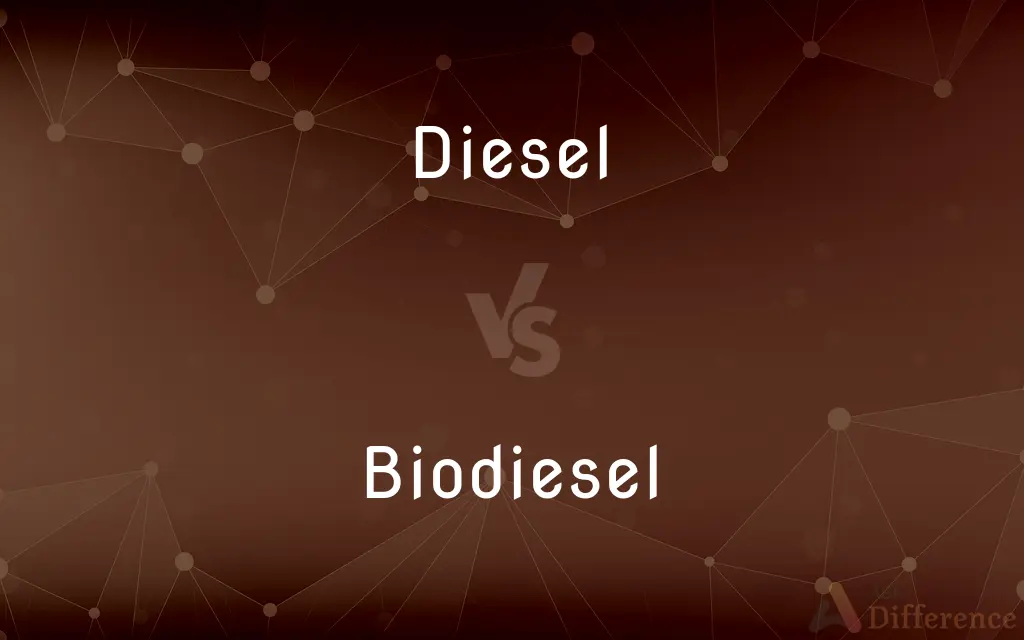Diesel vs. Biodiesel — What's the Difference?
By Tayyaba Rehman & Urooj Arif — Updated on May 4, 2024
Diesel is a petroleum-based fuel, efficient but emits pollutants, while biodiesel, derived from organic materials, burns cleaner but with variable energy content.

Difference Between Diesel and Biodiesel
Table of Contents
ADVERTISEMENT
Key Differences
Diesel fuel is sourced primarily from the fractional distillation of crude oil, making it a common choice for heavy-duty engines due to its energy density. Biodiesel, on the other hand, is produced from renewable sources such as vegetable oils and animal fats, offering a more environmentally friendly alternative with biodegradable properties.
Diesel engines are known for their robust performance and durability, often found in trucks, buses, and other heavy machinery. Whereas biodiesel can also be used in diesel engines without major modifications, it is less commonly used due to its higher gel point which can lead to performance issues in colder climates.
The energy content of diesel is higher, providing greater fuel efficiency per gallon compared to biodiesel. Biodiesel, however, compensates for its lower energy content with cleaner burning properties, producing fewer pollutants like sulfur and carbon monoxide.
Economically, diesel is typically less expensive than biodiesel, due to the established infrastructure and lower production costs associated with petroleum products. Biodiesel's price is influenced by the variability in the supply of its organic sources and the cost of processing technology.
Regarding emissions, diesel engines emit higher levels of particulates and NOx, which are harmful pollutants. Biodiesel significantly reduces emissions of these particulates and NOx, making it a better choice for reducing environmental impact and improving air quality.
ADVERTISEMENT
Comparison Chart
Source
Petroleum-based
Organic materials (vegetable oils, animal fats)
Energy Content
Higher energy content
Lower energy content
Environmental Impact
Higher pollutants emission
Lower pollutants emission
Economic Aspect
Generally cheaper
More expensive, price varies
Usage
Widely used in heavy machinery
Usable in similar engines, less common
Compare with Definitions
Diesel
Known for high energy density.
Diesel engines provide more power per liter of fuel compared to gasoline engines.
Biodiesel
Suitable for existing diesel engines without modifications.
Biodiesel can be used in any diesel vehicle without the need for engine changes.
Diesel
Produces more harmful emissions than biodiesel.
Diesel vehicles are often targeted in clean air initiatives.
Biodiesel
A renewable, biodegradable fuel made from organic materials.
Many environmentally conscious consumers choose biodiesel for their vehicles.
Diesel
Commonly used in transportation and industry.
Most large ships and trains use diesel engines for propulsion.
Biodiesel
Produces fewer environmental pollutants.
Using biodiesel significantly reduces a vehicle's emission of particulates.
Diesel
Less expensive than biodiesel in most markets.
The cost of diesel fuel remains lower than biodiesel, influencing consumer choice.
Biodiesel
Generally more expensive due to production costs.
Despite its environmental benefits, the higher price of biodiesel affects its popularity.
Diesel
A heavy-duty fuel derived from crude oil.
Trucks that transport goods across the country typically run on diesel.
Biodiesel
Can gel in colder temperatures, affecting performance.
In winter, biodiesel users might experience problems with fuel gelling.
Diesel
An internal combustion engine in which heat produced by the compression of air in the cylinder is used to ignite the fuel
A diesel locomotive
Biodiesel
Biodiesel is a form of diesel fuel derived from plants or animals and consisting of long-chain fatty acid esters. It is typically made by chemically reacting lipids such as animal fat (tallow), soybean oil, or some other vegetable oil with an alcohol, producing a methyl, ethyl or propyl ester by the process of transesterification.
Diesel
A diesel engine.
Biodiesel
A biofuel made by processing vegetable oils and other fats for use in a diesel engine, either in pure form or as an additive to conventional diesel fuel.
Diesel
A vehicle powered by a diesel engine.
Biodiesel
Fuel for diesel engines made from renewable organic raw materials, as opposed to fossil hydrocarbons.
Diesel
Any of various fuels used to power diesel engines, especially one derived from petroleum.
Diesel
To continue running after the ignition has been turned off, as when an open throttle supplies fuel to an engine that is still sufficiently hot to ignite it.
Diesel
To drive a diesel-powered vehicle
We dieseled through the countryside.
Diesel
To refuel a diesel-powered vehicle. Often used with up.
Diesel
A fuel derived from petroleum (or other oils) but heavier than gasoline/petrol. Used to power diesel engines which burn this fuel using the heat produced when air is compressed.
Diesel
(countable) A vehicle powered by a diesel engine.
Diesel
A rider who has an even energy output, without bursts of speed.
Diesel
Snakebite and black (a drink).
Diesel
(slang) A particular cannabis hybrid.
Diesel
To ignite a substance by using the heat generated by compression.
Diesel
(automotive) For a spark-ignition internal combustion engine to continue running after the electrical current to the spark plugs has been turned off. This occurs when there's enough heat in the combustion chamber to ignite the air and fuel mixture without a spark, the same way that heat and pressure cause ignition in a diesel engine.
Diesel
A type of internal-combustion engine in which the air drawn in by the suction stroke is so highly compressed that the heat generated ignites the fuel (usually a heavy oil), the fuel being automatically sprayed into the cylinder under pressure. The Diesel engine has a very high thermal efficiency.
Diesel
German engineer (born in France) who invented the diesel engine (1858-1913)
Diesel
An internal-combustion engine that burns heavy oil
Common Curiosities
Why is diesel generally cheaper than biodiesel?
Diesel is cheaper due to the established petroleum industry and higher production efficiency compared to biodiesel.
What is diesel?
Diesel is a petroleum-derived fuel used primarily in heavy-duty engines due to its high energy density.
Can biodiesel be mixed with diesel?
Yes, biodiesel can be mixed with diesel in any proportion, with blends commonly referred to by the percentage of biodiesel content, such as B20 (20% biodiesel).
How are diesel and biodiesel similar?
Both can be used in diesel engines and are utilized for similar applications in transportation and industry.
How does the energy content affect the usage of diesel versus biodiesel?
Diesel's higher energy content means it delivers more power and better fuel efficiency, making it preferred for heavy-duty applications, while biodiesel's lower energy content might require more frequent refueling.
What is biodiesel?
Biodiesel is a renewable fuel made from organic materials like vegetable oils and animal fats, used as an alternative to diesel.
Can diesel engines use 100% biodiesel?
Yes, many diesel engines can run on 100% biodiesel, known as B100, though it is less common due to potential cold weather issues and material compatibility.
What are the environmental benefits of biodiesel compared to diesel?
Biodiesel produces fewer pollutants such as sulfur oxides and particulates, making it more environmentally friendly.
How does biodiesel impact engine maintenance?
Biodiesel has solvent properties that can clean the engine's fuel system but might also lead to clogged filters initially when switching from diesel.
What are the storage requirements for biodiesel compared to diesel?
Biodiesel requires more careful storage to avoid oxidation and degradation; it should not be stored for as long as diesel without stability additives.
What are the long-term benefits of switching from diesel to biodiesel?
Long-term benefits include reduced environmental impact, less reliance on fossil fuels, and potential improvements in air quality and public health.
What are the main uses of diesel?
Diesel is primarily used in transport (trucks, buses, trains), industrial machines, and heavy equipment due to its energy efficiency and robustness.
What impact does the colder climate have on biodiesel?
In colder climates, biodiesel can gel and solidify, which can lead to engine and fuel system problems.
How does the production of biodiesel impact its cost?
The production of biodiesel is often more expensive than diesel due to the costs associated with sourcing and processing organic materials.
Are there any regulatory incentives for using biodiesel?
Many regions offer tax incentives, subsidies, or mandates for biodiesel usage to promote cleaner energy and reduce greenhouse gas emissions.
Share Your Discovery

Previous Comparison
Ghost vs. Shadow
Next Comparison
Landslip vs. LandslideAuthor Spotlight
Written by
Tayyaba RehmanTayyaba Rehman is a distinguished writer, currently serving as a primary contributor to askdifference.com. As a researcher in semantics and etymology, Tayyaba's passion for the complexity of languages and their distinctions has found a perfect home on the platform. Tayyaba delves into the intricacies of language, distinguishing between commonly confused words and phrases, thereby providing clarity for readers worldwide.
Co-written by
Urooj ArifUrooj is a skilled content writer at Ask Difference, known for her exceptional ability to simplify complex topics into engaging and informative content. With a passion for research and a flair for clear, concise writing, she consistently delivers articles that resonate with our diverse audience.
















































